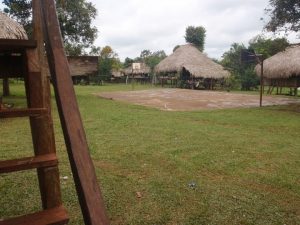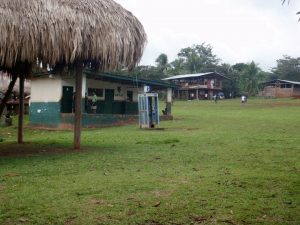Location
Mogué, Corrigimiento de La Palma, Provincia de Darién, Panamá
Community Description
Mogué is a community of 500 indigenous people in rural Panamá. It is about 10 hours travel time from Panama City, in the country´s least developed and least populated province.
There is no road access to the community. The only access is by small boat down the Pacific Coast and up the Mogué River, or a 3-hour hike by trail from the provincial capital, with a population of about 3,000 people.
Community members base their lives around the river, bathing, washing clothes and dishes, and preparing food. The community currently uses pit latrines, some very close to the river. This poses a health hazard due to the runoff into the drinking water source.
 There is an increasing temptation for the villagers to start using chemical fertilizers for their crops. This also presents problems with runoff into the river and the streams which feed into the village aqueduct, its primary drinking water source.
There is an increasing temptation for the villagers to start using chemical fertilizers for their crops. This also presents problems with runoff into the river and the streams which feed into the village aqueduct, its primary drinking water source.
Mogué has a 4-room schoolhouse that serves approximately 120 students. The schoolhouse has no adequate bathroom facilities and has a very large school garden where the students plant a number of crops such as plantains, guandú, and corn.
Project Description
This project is to build a composting latrine at the school for use by the community and the school.
This will be a model project which incorporates training. The construction will be facilitated by Peace Corps Panamá´s latrine coordinator to serve as a training to 10-20 village men who have expressed a great deal of interest in learning how to build one.
The compost produced will be used in the school garden. This will serve as an instrument to teach the students the importance and utility of organic fertilizers.
Water Charity funds will be used exclusively for materials and gasoline to transport said materials. The labor and technical expertise will be provided by the community and the Peace Corps.
Those trained via the seminar and latrine construction will subsequently be capable of building dry composting latrines for personal use from either cem ent and cinder block or wooden boards, and teaching the technology to others.
ent and cinder block or wooden boards, and teaching the technology to others.
Project Impact
500 people will benefit from this project, including 120 students at the school.
Peace Corps Volunteer Directing Project
Samuel Packard
Comments
Promoting the use of dry composting latrines is vital for riverine cultures like the Embera who populate this area. The technology serves to preserve the freshwater supply, and also to create a source of rich organic compost for agricultural activities.
Dollar Amount of Project$385.00
Donations Collected to Date
$385.00
Dollar Amount Needed
$0.00 – This project has now been fully funded through the generosity of The Soneva SLOW LIFE Trust as a part of their Clean Water Projects initiative.
We encourage others to continue to donate using the Donate button below, and we will notify Samuel of your donation. Additional funds will be used to fund the next project by the PCV and/or other projects in the country of service.
![]() This project has been finished. To read about the conclusion of the project, CLICK HERE.
This project has been finished. To read about the conclusion of the project, CLICK HERE.